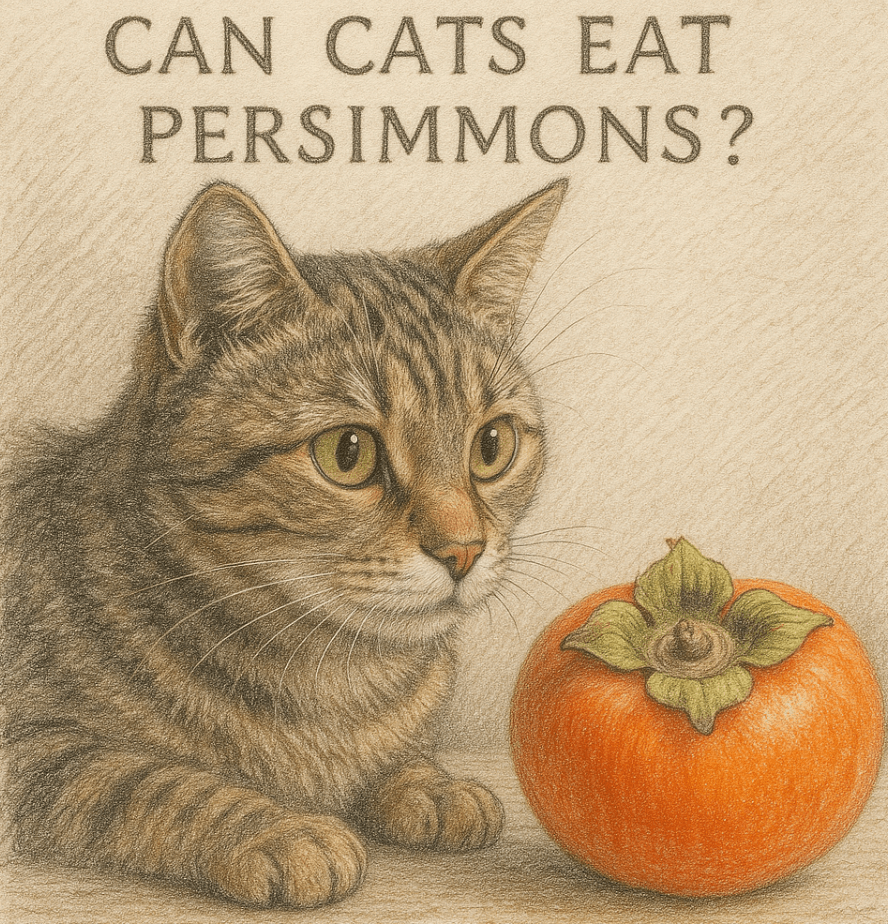Can Cats Eat Persimmons?
When it comes to feeding our feline friends, many pet owners wonder whether certain human foods are safe for cats. Persimmons, with their sweet and tangy flavor, may seem like an appealing treat to share with your cat. However, as obligate carnivores, cats have unique dietary needs that differ significantly from ours. While persimmons are not inherently toxic to cats, there are important considerations to keep in mind before offering them a bite. In this blog post, we’ll explore the potential benefits, risks, and guidelines for feeding persimmons to your cat, ensuring their health and happiness remain a top priority.
Potential Risks of Feeding Persimmons to Cats
While persimmons are generally safe in small amounts, they can pose certain risks if not fed carefully. Understanding these dangers is crucial to protect your cat’s well-being.
Choking Hazard:
The seeds and tough skin of persimmons can pose a choking risk, especially for smaller cats or those prone to gulping food.Digestive Upset:
The high fiber content in persimmons may cause stomach discomfort, diarrhea, or vomiting if consumed in large quantities.Obstruction Risk:
Persimmon seeds are indigestible and could lead to intestinal blockages if swallowed whole.Sugar Content Concerns:
Persimmons are naturally high in sugar, which can be harmful to cats, particularly those with diabetes or obesity issues.Allergic Reactions:
Though rare, some cats may experience allergic reactions, such as itching or swelling, after consuming persimmons.
These risks highlight why moderation and preparation are key when considering persimmons as an occasional treat for your cat.
Benefits of Persimmons for Cats (In Moderation)
While cats don’t require fruits in their diet, persimmons can offer minor nutritional benefits when given sparingly. Here’s what makes them a potentially positive addition to your cat’s menu.
Vitamin C Boost:
Persimmons contain vitamin C, which supports immune function and overall health, though cats typically produce their own vitamin C.Antioxidant Properties:
The antioxidants in persimmons may help reduce oxidative stress and inflammation in your cat’s body.Hydration Support:
With their high water content, persimmons can contribute to your cat’s hydration, especially if they’re reluctant drinkers.Low-Calorie Treat Option:
When prepared properly, persimmons can serve as a low-calorie snack for cats maintaining a healthy weight.Mental Stimulation:
Offering a small piece of persimmon as a rare treat can provide sensory enrichment and variety in their diet.
While these benefits exist, they should be weighed against the potential risks and your cat’s individual dietary needs.
Check this guide 👉Can Cats Eat Sashimi? Best 7 Expert Tips!
Check this guide 👉Can Cats Eat Clams? Best 7 Expert Tips!
Check this guide 👉Can Cats Eat Radishes? Best 7 Expert Tips!

Safe Ways to Offer Persimmons to Cats | Risks to Avoid When Feeding Persimmons |
|---|---|
Remove seeds and skin before serving | Feeding large chunks that could choke |
Cut into small, bite-sized pieces | Giving persimmons daily or in excess |
Serve plain, without added sugars or spices | Ignoring signs of digestive upset |
Offer as an occasional treat, not a staple | Allowing access to persimmon trees or plants |
Monitor for allergies or adverse reactions | Feeding persimmons to diabetic cats |
How to Safely Introduce Persimmons to Your Cat
If you decide to let your cat try persimmons, it’s essential to follow these steps to ensure their safety and comfort.
Start with a Tiny Piece:
Begin by offering a very small piece of ripe persimmon to gauge your cat’s reaction and tolerance.Remove Seeds and Skin:
Always discard the seeds and peel off the skin to eliminate choking hazards and indigestible parts.Choose Ripe Persimmons:
Unripe persimmons contain tannins that can cause mouth irritation or digestive issues; opt for fully ripe fruit instead.Monitor for Adverse Reactions:
Watch for signs of vomiting, diarrhea, or allergic reactions after your cat consumes persimmons.Limit Frequency:
Treat persimmons as an occasional indulgence rather than a regular part of your cat’s diet.
By following these precautions, you can minimize risks while allowing your cat to enjoy a rare fruity treat.
Signs Your Cat May Not Tolerate Persimmons
Even with careful preparation, some cats may not handle persimmons well. Recognizing these warning signs allows you to act quickly if something goes wrong.
Vomiting or Diarrhea:
These symptoms indicate digestive distress and suggest that persimmons may not agree with your cat.Lethargy or Discomfort:
A sudden lack of energy or visible discomfort could signal an adverse reaction to the fruit.Excessive Drooling:
Drooling may occur if your cat experiences irritation from unripe persimmons or an allergic response.Loss of Appetite:
Refusal to eat or disinterest in meals might indicate that persimmons upset their stomach.Swelling or Itching:
Signs of an allergic reaction, such as facial swelling or scratching, require immediate veterinary attention.
Being vigilant about these signs ensures your cat stays safe if you choose to introduce persimmons into their diet.
Common Mistakes to Avoid When Feeding Persimmons to Cats
Feeding persimmons to your cat requires careful consideration to avoid mistakes that could harm their health. Here are some common errors to steer clear of.
Feeding Whole Fruit:
Offering an entire persimmon increases the risk of choking and overconsumption of sugar.Ignoring Preparation Steps:
Failing to remove seeds and skin leaves your cat vulnerable to blockages and irritation.Treating Persimmons as a Staple Food:
Cats don’t need fruit in their diet, and relying on persimmons as a regular treat can lead to nutritional imbalances.Assuming All Cats Will Like Them:
Some cats may show zero interest in persimmons, and forcing them to try it can create stress.Overlooking Underlying Health Conditions:
Cats with diabetes or obesity should avoid persimmons due to their high sugar content.
Avoiding these mistakes ensures a safer and more enjoyable experience for your cat.
Alternatives to Persimmons for Feline Treats
If persimmons don’t suit your cat’s preferences or dietary needs, there are plenty of other safe and healthy alternatives to consider.
Plain Cooked Chicken:
A small piece of unseasoned, boneless chicken provides protein and satisfies your cat’s carnivorous instincts.Pumpkin Puree:
Unsweetened pumpkin puree aids digestion and can help relieve constipation or diarrhea.Blueberries:
Low in calories and rich in antioxidants, blueberries make a tasty and nutritious occasional treat.Watermelon (Seedless):
Seedless watermelon offers hydration and a refreshing snack for cats who enjoy fruit.Catnip or Treat-Specific Snacks:
Commercial cat treats or catnip-infused toys cater specifically to feline tastes and dietary requirements.
These alternatives allow you to spoil your cat without taking unnecessary risks.
Understanding Your Cat’s Relationship with Human Foods
Cats have different dietary needs compared to humans, and understanding their relationship with human foods helps prevent accidental harm.
Obligate Carnivore Diet:
Cats require a diet primarily composed of animal protein, making plant-based foods like persimmons less essential.Limited Taste Buds:
Cats have fewer taste buds than humans, meaning they may not find fruits as appealing or flavorful.Sensitivity to Sugar:
Unlike humans, cats lack the enzymes needed to process sugars effectively, making sugary foods potentially harmful.Curiosity vs. Necessity:
Cats may show interest in human foods out of curiosity, but this doesn’t mean they need or benefit from them.Individual Preferences Matter:
Every cat is unique—some may enjoy trying new foods, while others prefer sticking to their usual meals.
By recognizing these factors, you can better tailor your approach to sharing human foods with your feline companion.
Frequently Asked Questions About Cats and Persimmons
Are persimmons toxic to cats?
No, persimmons are not toxic, but they can cause digestive issues if not prepared or fed properly.
How much persimmon can I give my cat?
Limit servings to a small piece no larger than a thumbnail, and only offer it occasionally.
Can kittens eat persimmons?
Kittens have sensitive digestive systems, so it’s best to avoid giving them persimmons altogether.
What should I do if my cat eats a persimmon seed?
Monitor your cat closely for signs of obstruction, and consult your vet if you notice any unusual behavior.
Are dried persimmons safe for cats?
Dried persimmons are too sugary and sticky for cats, making them unsuitable as a treat.
Prioritizing Your Cat’s Health When Sharing Persimmons
While persimmons can be a fun and nutritious treat for cats in moderation, they come with important caveats that every pet owner should consider. By removing seeds and skin, monitoring portion sizes, and watching for adverse reactions, you can safely incorporate this fruit into your cat’s diet on rare occasions. Remember, cats thrive on a meat-based diet, and treats like persimmons should never replace their primary nutrition. With care and attention, you can indulge your curious feline friend without compromising their health or happiness.
What Is Toxic to Cats: A Guide to Keeping Your Feline Safe Cats are curious creatures, but their natural curiosity can sometimes …
Portuguese Podengo: Best 7 Expert Tips! – Learn about the lively, loyal Portuguese Podengo breed, its care needs, and why it’s perfect for active families. Discover expert advice now!
What is Toxic to Dogs: Best 7 Expert Tips! – Discover common toxins, symptoms of poisoning, and how to keep your dog safe from harmful substances.
Maltese Dog Life Span: Best 7 Expert Tips! – Discover how to maximize your Maltese’s lifespan with expert advice on health, diet, and care.



